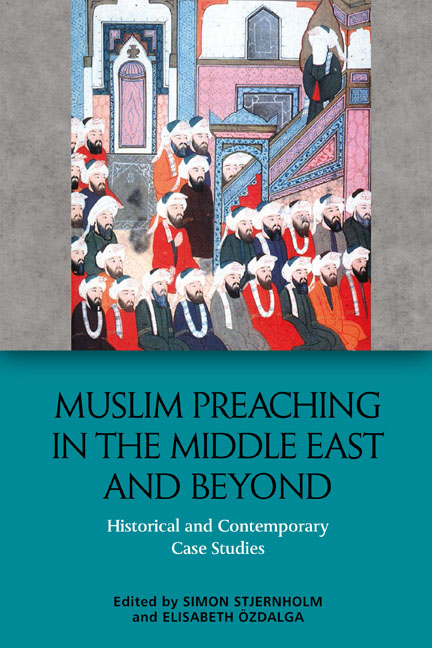1 - The Framework of Islamic Rhetoric: The Ritual of the Khuṭba and its Origin
Published online by Cambridge University Press: 20 October 2020
Summary
The Khuṭba Ritual
The word khuṭba means ‘oration’ and can be used in Arabic for any kind of public speech. To most people today, however, the word designates a special kind of public oration, namely the sermon in the mosque held at noon on Fridays. It is this kind of speech that will be dealt with in this chapter, since the Friday noon khuṭba is the main context of rhetoric in Islam. In many ways it can be seen as the Middle Eastern counterpart to the public political speech in Hellenistic antiquity – the mosques in Islam playing a similar role to that of the agora/forum in the Hellenistic-Roman world. To be sure, mosques are centres for religious activities like praying, study and discussion, but they also function as a general meeting place where a great variety of things can be discussed. The khuṭba ritual on Fridays, however, has a special status as one of the main rituals of Islam. It is also a unique Islamic institution, the origins of which are not completely known. This chapter offers an introduction to the historical aspects of that ritual.
The outline of the ritual practised for more than a millennium is as follows: after the call to prayer (adhān) from the minaret at noon when the congregation is assembled, the preacher (khaṭīb), often equipped with a stick, ascends the minbar or ‘pulpit’, and sits down. Then a second adhān is heard, this time not sung in the festive manner of the call to prayer from the minaret. The khaṭīb then rises, gives a khuṭba, often leaning on the stick, after which he sits down again. After a short silence he rises a second time and gives another khuṭba. Then he descends from the minbar while the muʾadhdhin, the person voicing the call to prayer, sounds a new adhān for prayer, the iqāma. The following ṣalāt prayer consists of two rakʿāt or prayer cycles, not four as is the religious obligation (farḍ) for the noon prayer on other weekdays (Wensinck 1986: 74–5; for a classic description of the ceremony including a specimen of a sermon, see Lane 1966: 85–92).
- Type
- Chapter
- Information
- Muslim Preaching in the Middle East and BeyondHistorical and Contemporary Case Studies, pp. 19 - 29Publisher: Edinburgh University PressPrint publication year: 2020



